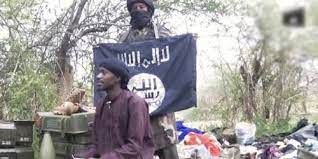The feared leader of the Islamic State West Africa Province (ISWAP) Abu Musab Al-Barnawi is dead, apparently killed during a gun battle in Borno State, if the latest reports are anything to go by.
One report suggests that the ISWAP warlord died toward the end of August but the Nigerian government has been tight-lipped about the issue which if true will come as a huge propaganda coup for the country’s security forces.
The Nigerian military is still fighting a determined 12-year Islamist insurgency in the northeast which has killed thousands and displaced over three million people.
Another version of events around Al-Barnawi suggest he was killed in a skirmish with rival factions within ISWAP.
Reports of Al-Barnawi’s death come just weeks after the reported death of his former Boko Haram boss Abubakar Shekau, reportedly killed by an ISWAP militia.
Al-Barnawi is the son of late Boko Haram founder Mohammed Yusuf who died in the custody of the Nigerian police shortly after his capture in 2009.
The current insurgency in northern Nigeria by the militant sect began that year.
The ISWAP leader has been on the Nigerian government’s list of most wanted terrorists thanks to his notoriety for being ruthless during raids and ambushes against operatives of the state security services.
For several years most of his activities were centred around the Lake Chad region.
Aside from infiltrating and destroying Nigerian military camps in Borno, his ISWAP took the fight to neighbouring Yobe State and extended it beyond Nigeria, to Chad and Niger.
Al-Barnawi was to succeed his father as leader of Boko Haram but eventually got involved in a bitter power struggle with Shekau for the soul of the organisation in 2016.
Shortly afterwards, the Islamic State (IS) confirmed him as their favoured leader in Boko Haram which became their affiliate that same year.
As ISWAP leader, Al-Barnawi was reputed to have won and maintained the loyalty of Boko Haram fighters who had joined the organisation when his father led the group.
According to some unconfirmed reports he had been prepared for the ISWAP role by receiving training from ISIS before he became its leader.
One report says he benefitted from regular financial cash incentives from ISIS but also addressed deficits by taxing local populations and engaging in fisheries activities in the areas under ISWAP control in Borno.
If one version of how Al-Bernawi met his end is to be believed, he was ambushed along with five other ISWAP senior commanders by Nigerian soldiers in Bula Yobe, a community near Borno State’s border with Yobe.
However, the other version says he died in a leadership crisis within ISWAP that degenerated to full scale armed hostility with a faction that originated from Central Africa.
Meanwhile the Nigerian military high command has not commented on the veracity of both claims.
The Director, Defence Information, Maj.-Gen. Benjamin Sawyer has been quoted as saying “if ISWAP or BHTs are fighting among themselves, it is the media that always gives the entire nation the information. It is not us, because we are not in their camps”.
Many believe the Nigerian government is understandably reticent about the issue thanks to its sensitivity as a security matter.
WN/as/APA


